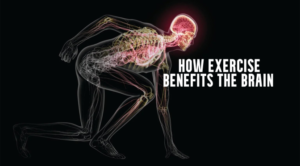Just three short, high-intensity workouts each week are necessary to increase brain size.
Researchers from the US and Canada set out to investigate the impact on brain volume of engaging in two or three days a week of moderate to intense exercise.

Following the participants’ health-related behaviors and an analysis of over 10,000 MRI brain scans, the researchers found that individuals with regular exercise had larger brains.
Particularly, this was observed in regions that control sensory perception, motor control, information and memory processing, and decision-making.
This effect was observed in a variety of physical activities, such as walking, running, and team sports.
However, scientists found that even 4,000 steps a day can improve brain function, so think twice before setting a goal to reach 10,000 steps each day.
The findings provide promise for our knowledge of dementia and its prevention. Regular physical activity is thought to enhance cognitive functioning and remove plaques in the brain that might cause dementia.
The study’s principal investigator, Dr. Cyrus Raji, stated: “Our research supports previous studies that show being physically active is good for your brain.”
“Exercise helps maintain brain size, which is crucial as we age and not only lowers the risk of dementia.”
Researchers from the US and Canada analyzed brain scans from 10,125 healthy persons, who were still younger than the average dementia patient at 53 on average.
Over the course of two weeks, they inquired about the frequency of activity from each participant, splitting the population into two groups: those who exercised and those who did not.
The other group was referred to as the non-exercise group if they exercised less frequently or not at all, whereas the exercise group worked out an average of two to three days per week.
The two-to three-day barrier, which is significantly less than the federal government’s five-day, 150-minute requirement, was purposefully chosen, according to the study’s authors, to identify a level of physical activity that more people might achieve.
About 75% of research participants participated in at least 10 minutes a day of moderate-to-intense physical activity, such as walking, swimming, or cycling, four times a week on average.
Dr. David Merrill, co-author of the study and head of the Brain Health Center at the Pacific Neuroscience Institute, stated: “We discovered that even modest amounts of physical activity, like walking less than 4,000 steps a day, can improve brain health.”
“This is a more realistic goal for many people because it is significantly less than the frequently recommended 10,000 steps.”
Individuals that engaged in physical activity exhibited increased amounts of gray and white matter, two essential brain structures.
The brain’s ability to process language and senses depends on gray matter. Gray matter makes up around 40% of the brain.
Alzheimer’s disease hallmarks include tau tangles and beta-amyloid plaque accumulation in the hippocampal region.
The hippocampus degenerates as the disease worsens, causing problems processing new information and recalling recent events.
It has long been established that being active, particularly as an adult, has several positive health effects on the aging body and brain.
Exercise has numerous neurological benefits, ranging from boosting oxygen flow to the brain and producing new brain cells to replace those lost with age to lowering inflammation and guarding against free radical-induced cell damage.
The Journal of Alzheimer’s Disease published the study.

